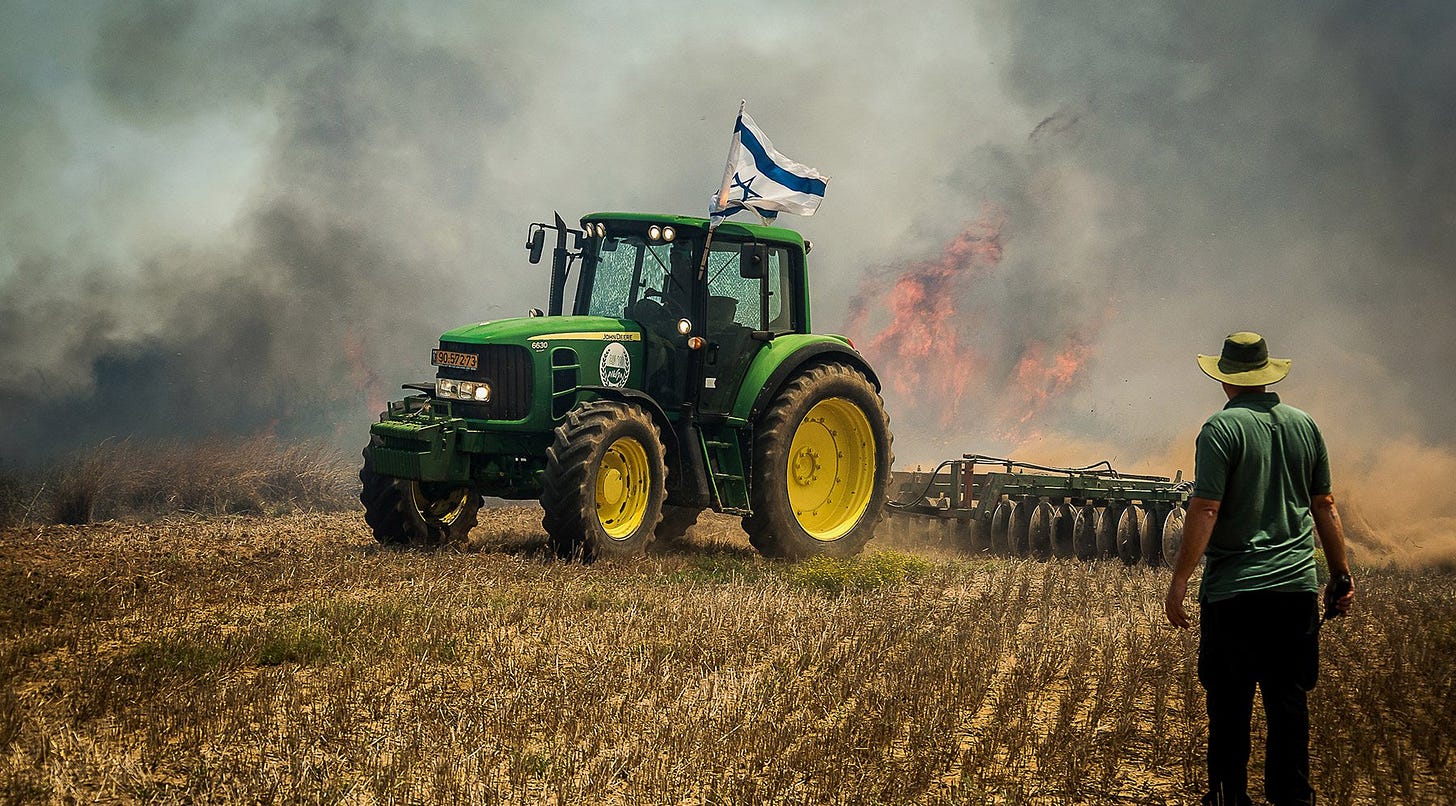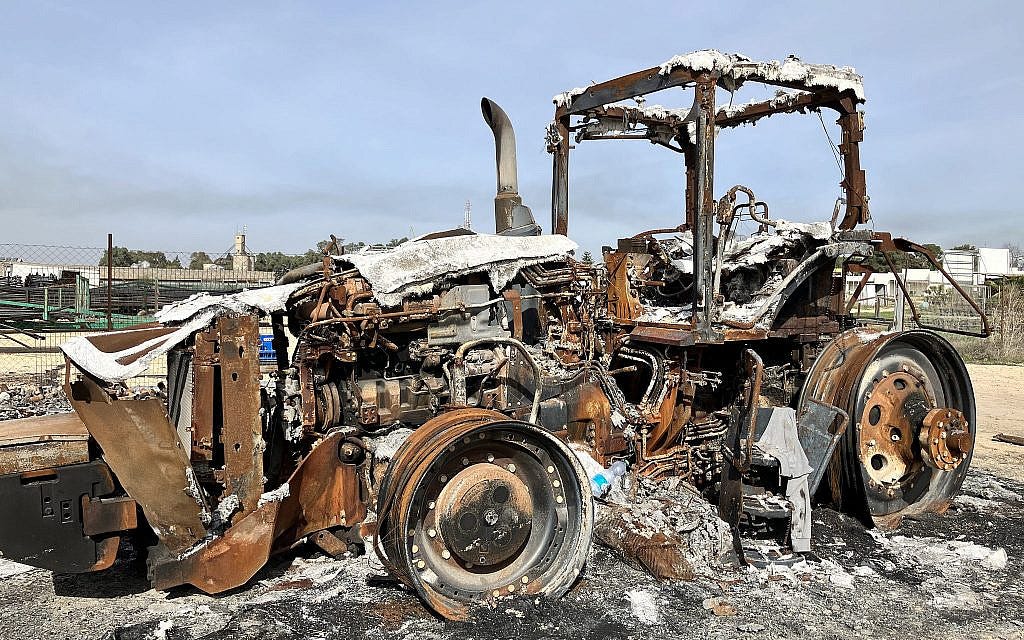Hamas tried to destroy Israeli agriculture, and failed.
“Agriculture wasn’t collateral damage. It was a target, a deliberate target.”
Please consider supporting our mission to help everyone better understand and become smarter about the Jewish world. A gift of any amount helps keep our platform free and zero-advertising for all.
You can also listen to the podcast version of this essay on Apple Podcasts, Google Podcasts, and Spotify.
This is a guest essay written by Danielle Abraham, the head of ReGrow Israel.
After three months spent tirelessly scouring the news, I thought I understood what happened on October 7th.
The loss was still too much to bear, but I thought I understood.
Then came the curveball.
During one of my many trips to the “Gaza Envelope” (the Israeli towns that border the strip) as part of my work with ReGrow Israel — an initiative dedicated to saving and strengthening the devastated farming communities in the western Negev — one sentence stood out.
I was meeting with the head of agriculture at the kibbutz, Nahal Oz, and as the afternoon drew to a close, his words rang out clearly against the backdrop of distant artillery fire:
“Agriculture wasn’t collateral damage; it was a target, a deliberate target.”
He went on to explain, with chilling detail, the precise, coordinated and systematic nature of Hamas’ agricultural terrorism.
They didn’t just destroy whatever they could find. They came with hammers and deliberately targeted key taps to flood orchards.
They didn’t just kill Jews and Israelis. They sought out, massacred, and abducted foreign workers to undermine a vital source of labor for the agricultural sector.
They didn’t just wantonly steal whatever caught their eye. They went straight for the computer chips that regulate entire irrigation systems, starving whole fields and crops straight at the source.
Even as someone working in agriculture, the fact that agriculture had been a deliberate target of war had been lost on me. This narrative has been remarkably absent from our collective conversations about October 7th.
It shouldn’t, and it holds two important lessons for us all.
The first is a powerful lesson in resilience. I have never seen such resolve.
Two days after the attack that cost the lives of over 90 of his family and friends, Motti returned to Kibbutz Be’eri and stepped into his new role — a battlefield promotion of sorts. As the kibbutz’s Head of Farming lay in hospital, Motti gathered the cows that had been roaming free and herded them back to safety, navigating blood-stained streets and weaving between tanks.
Some of the fields belonging to Nahal Oz are currently green with young wheat, despite being located only 700 meters (four-tenths of a mile) from Gaza. How? Because they sowed those crops under fire. Many other communities have done the same, sharing what little equipment they can find so they can keep going, even at great personal risk.
The second lesson is the vital and unquestionable importance of agriculture for Israel.
Of course, farming was targeted. It embodies the Jewish people’s attachment to the land of Israel and our sense of stewardship over this little patch we call home. For kibbutz residents, farming is part of their DNA.
Of course, farming was targeted. It underpins Israel’s food security and the slightest shock sends ripples throughout the country.
Of course, farming was targeted. It drives the economy of the western Negev and takes years to rebuild.
Of course, farming was targeted. Our unrivaled agricultural prowess is one of Israel’s proudest achievements. It’s a shining example of our tiny state helping to better the entire world: ushering in smarter and more sustainable farming that will feed generations to come.
We should never lose sight of the national role shouldered tirelessly by our farmers. We need them. They need us. Rebuilding these communities isn’t just about helping some of the bravest and most inspiring people you’ll ever meet. It is vitally important to Israel.
Israel made the desert bloom. Against all odds, a group of visionary pioneers realized an agricultural miracle. They turned a dry, rocky, barren desert quite literally into a garden of Eden. And this was the true triumph of Zionism, a pioneering spirit and no small dose of ingenuity and innovation.
Israel is home to two unique types of agricultural communities: the kibbutz, a collective community in which the means of production are communally owned and each member’s work benefits all; and the moshav, a farming village where each family maintains its own household and works its own land, while purchasing and marketing are conducted co-operatively.
These communities developed as Jews from all over the world immigrated to their indigenous homeland, beginning in the 1800s and gaining steam the following century. They purchased land that was mostly semi-arid and embarked on rural settlement, although much of the region had been rendered non-farmable by deforestation, soil erosion, and neglect.
Since independence in 1948, agricultural production has expanded 16 times, while irrigated farmlands have increased more than sixfold. Farmers have also grown more with less, using 12 percent less water to generate 26 percent more produce.
No region embodies this triumph more than the western Negev. Producing 70 percent of the country’s fresh vegetables, 20 percent of the fruit, and 6.5 percent of the dairy, before October 7th visitors came from all over the world to view this miracle.
The immediate damage is self-evident and devastating:
Millions of dollars’ worth of equipment stolen or destroyed (Yes, there are Israeli tractors being driven around Gaza.)
Over $500 million in lost income
Widespread infrastructure damage
Loss of 7,000-plus experienced farmworkers
Grave damage to the soil impacting its fertility for years to come
But the real concern is that October 7th created a crisis which threatens the very existence of the western Negev’s pioneering agriculture.
We must acknowledge that our goal has to be to secure the long-term future. In that sense, the farmers and the pioneering agricultural of the Western Negev are one of the overlooked casualties of that very dark Shabbat.
Yes, thousands of volunteers have flocked to their aid to harvest produce that would otherwise have wasted in the fields, sometimes even at considerable risk due to ongoing rocket fire. The efforts are commendable.
What has gained less attention, however, is the critical need to secure the long-term future of these same farmers and their farms. Long-term means the next 20 years.
It means long-term agricultural planning for the region. It means thoughtful innovation to overcome the challenges of today and tomorrow. It means the integration of environmentally sustainable practices to ensure the soil for the next generations. It means educating the next generation and creating an attractive and profitable agricultural framework to lure younger farmers to the region.
And ultimately it means putting in place now the systems, centers, and services that will serve the future of the region.
As Israel’s first prime minister, David Ben-Gurion, said: “It is in the Negev where the creativity and pioneering vigor of Israel shall be tested.”
Israel made the desert bloom. And we will do it again.



Why is it so hard for most of the world to understand the love of the land that most Jews feel in their souls? Without Israel, we are lost as a people. Israel makes us feel proud. Terror against Israelis is felt throughout the Diaspora. We must help the Israelis prevail, no matter where we live.
I naively thought that the only harm that befell the agricultural areas was the loss of workers, I had no idea that agriculture was a specific target as well as the people. This is awful. Thank you for highlighting this, it needs to be amplified even more!